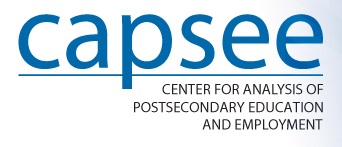Analyzing the Relationship Between Higher Education and Jobs at CAPSEE
This year’s Center for Analysis of Postsecondary Education and Employment (CAPSEE) Convention featured four plenary and 12 breakout sections all centered on the idea of The Value of Education—And How to Further Strengthen It. Specifically, we came together to review emerging research on the relationship between higher education and jobs. There has always been tension between higher education’s role in vocational training and its broader educational and cultural function. While I think this tension will always be there, improving our assessment techniques will go a long way toward minimizing it and increasing our ability to collect quality, usable data.
The most difficult programs to assess are those whose primary goal is not a specific job. Although the lack of experimental or quasi-experimental research means there is no clear causal link between programs and outcomes, the correlations do have value. Measuring the impact of any degree that focuses on education rather than preparation for a specific job will probably always be challenging but assessing the incomes of graduates in vocationally-oriented programs should become easier and more reliable in the next few years.
Since most students are in programs with reasonably clear vocational outcomes (whether an MD or an HVAC tech) there is data to be analyzed. The health professions are especially useful for studies spanning different states, time periods, program types and methodologies, although selection bias may be an issue for potential healthcare workers. Also, the findings are much more mixed depending on methodology, definitions, state or program length than for other fields.
Throughout the convention, it was clear from the variety of well-researched and provocative papers that we remain far from a consensus on how the returns of postsecondary education should be measured. I believe, though, that the current state of our understanding should not be an end, but a beginning. Not being able to measure everything does not mean we should measure nothing.
If you missed the CAPSEE convention, presentations are available for download
here.

